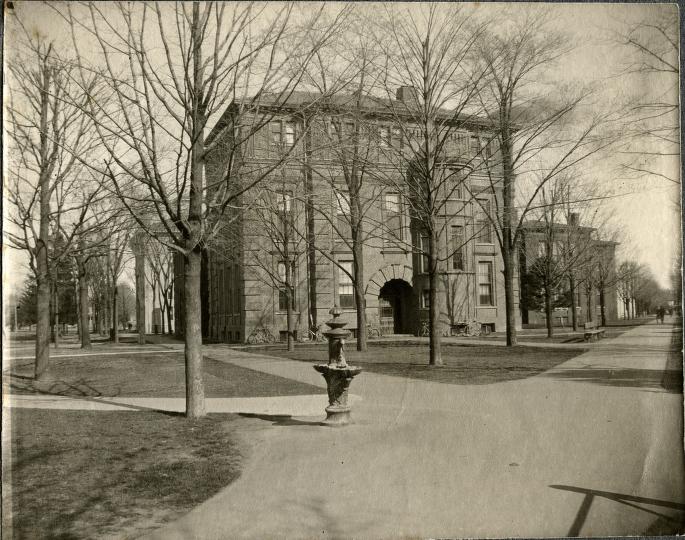
Michigan Chemical Engineering celebrates 125 years
Since 1898, the Department of Chemical Engineering has been dedicated to driving human excellence and developing engineering solutions to overcome society’s greatest and most complex challenges.

Since 1898, the Department of Chemical Engineering has been dedicated to driving human excellence and developing engineering solutions to overcome society’s greatest and most complex challenges.
This April, Michigan Chemical Engineering will celebrate a milestone anniversary, marking its 125th year as a department at the University of Michigan. Since 1898, the Department of Chemical Engineering has been dedicated to driving human excellence and developing engineering solutions to overcome society’s greatest and most complex challenges.
“This is an extraordinary milestone for us. For 125 years our department has educated chemical engineers, conducted groundbreaking research and found innovative solutions to complex problems,” said Anthony C. Lembke Department Chair of Chemical Engineering, Sharon Glotzer. “As leaders in chemical engineering, our department has served the common good in times of war and times of peace, during pandemics in three different centuries, and through countless significant events that shaped and changed our world.”
As leaders in chemical engineering, our department has served the common good in times of war and times of peace, during pandemics in three different centuries, and through countless significant events that shaped and changed our world.
Sharon Glotzer
Anthony C. Lembke Department Chair of Chemical Engineering
The department’s long tradition of excellence in both education and research was initiated by Professor Edward DeMille Campbell when the Board of Regents approved the first course of study at the University of Michigan leading to a bachelor of science in chemical engineering in 1898.
The University of Michigan recognized the importance of teaching the applications of chemistry to industrial life almost from its very beginning, and was the second university in the United States to offer a course in chemical engineering.

By 1925, the field of chemical engineering was recognized nationally as a branch of engineering and the University of Michigan was one of only 14 accredited curriculums listed by the the American Institute of Chemical Engineers.
The year the department celebrated its 50th anniversary, honoring the accomplishments of the community and their contributions to the field. From 1898 to 1948, the department had enrolled a total of 3,876 undergraduate students, granting 2,151 bachelor’s degrees and 940 graduate degrees.
In 1959, Professor of Chemical Engineering Donald Katz initiated a project on the use of computers in engineering education, funded by the Ford Foundation. The project awarded the University with a $900,000 three-year grant to “enrich engineering education.” During the three–year project, more than 150 engineering faculty members from schools around the country were taught to use a computer.
In 1971, the department truly became its own when the combined Chemical and Metallurgical Engineering Department separated into two: Chemical Engineering and Materials and Metallurgical Engineering.
By this date, the Department of Chemical Engineering had 17 full-time faculty members, and an enrollment of 170 undergraduates and 55 graduate students. The regular chemical engineering curriculum offered areas of specialization including biochemical, polymer, petroleum, electrochemical, materials, environmental, control and computers and systems engineering.
In 2000, two years after the centennial anniversary, the department established its pharmaceutical engineering program under the direction of Henry Wang, which continues to be a primary research area within the department.
A few years later, the University of Michigan Board of Regents approved the decision to negotiate the purchase of the former Pfizer pharmaceutical research campus in Ann Arbor, Michigan. The University of Michigan successfully completed the acquisition on June 16, 2009, and named the site the University of Michigan North Campus Research Complex (NCRC).
The NCRC continues to provide space for U-M researchers, including chemical engineers, to collaborate in an environment that encourages discovery, innovation and creativity.

Currently, under the leadership of Sharon Glotzer, the department continues to make contributions to the field of chemistry and the chemical engineering profession. From investigating methods to improve sustainable energy storage to testing nano-engineered brain cancer treatment, the department is dedicated to finding innovative solutions to complex challenges.
“I am awed by our history, and by how far we’ve come,” Glotzer said. “We look to the future with a vision that expands and redefines the boundaries of the chemical engineering discipline – engineering the future of human health, engineering to net zero for a sustainable planet, and engineering matter-on-demand. We are cognizant of our place in Michigan ChE history and our obligation to its bright future.”
Looking ahead to its 125th anniversary in April, the department will continue its legacy of leading groundbreaking research and educating engineers whose empathy, insight and knowledge enable them to translate ideas and discoveries into equitable engineering solutions.